

Against Positive Thinking: Uncertainty as the Secret of Happiness. 35 Must-Read Spiritual Books You’ve Never Heard Of. Author Amateo Ra: You might have had an experience many of us share: We get an idea, a thought or even a dream with a theme that truly inspires us, stretches our minds or opens us up to a greater understanding ourselves and our lives.
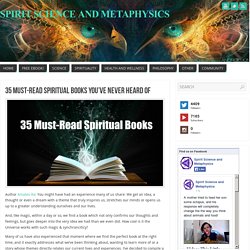
And, like magic, within a day or so, we find a book which not only confirms our thoughts and feelings, but goes deeper into the very idea we had than we even did. How cool is it the Universe works with such magic & synchronciticy? Many of us have also experienced that moment where we find the perfect book at the right time, and it exactly addresses what we’ve been thinking about, wanting to learn more of or a story whose themes directly relates our current lives and experiences. I’ve decided to compile a list of 35-very special books which have fit this description for thousands if not millions of people. These are primarily lesser-known books, although there are a few you might identify or think are very popular. 1) The 5th Sacred Thing by Starhawk. Religion’s smart-people problem: The shaky intellectual foundations of absolute faith.
Should you believe in a God?
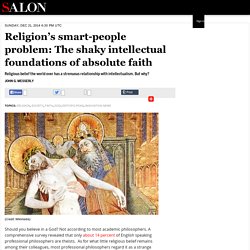
Not according to most academic philosophers. A comprehensive survey revealed that only about 14 percent of English speaking professional philosophers are theists. As for what little religious belief remains among their colleagues, most professional philosophers regard it as a strange aberration among otherwise intelligent people. Praying with the body: the hesychast method and non-Christian parallels : theological portal Bogoslov.Ru. Metropolitan Kallistos addresses the question of whether there are parallels between the hesychastic method of prayer and other apparently similar techniques of prayer in Hinduism and Islam.
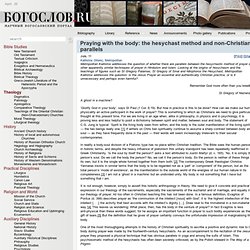
Looking at the origins of hesychasm and the teachings of figures such as St Gregory Palamas, St Gregory of Sinai and Nikiphoros the Hesychast, Metropolitan Kallistos addresses the question: is the Jesus Prayer an essential and authentically Christian practice, or is it unnecessary and perhaps even harmful? Remember God more often than you breathe. St Gregory of Nazianzos A ghost in a machine? ‘Glorify God in your body’, says St Paul (1 Cor. 6:19). Sr. Tereza Vodjana - Jesus prayer.wmv. How-to: the jesus prayer. Many Orthodox Christians have heard of the Jesus Prayer, or seen a prayer rope. Some wear them on their wrists as a symbol of faith. But, many people, do not know the origins or the importance of this prayer. So, I thought it would be a good thing to share some of the things our saints have written throughout the centuries on this topic.
St Vladimir's Orthodox Theological Seminary. By Dr.
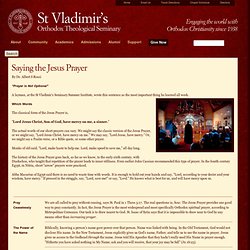
Albert S Rossi. Christian Meditation, The Jesus Prayer - Home. The Practice of Prayer of the He. Teaching Series - The Jesus Prayer. Prayer of The Heart : The Way of Continual Prayer To Jesus Christ, an Ancient Christian Tradition. Celtic Christianity. What is a liminal space? A liminal space, the place of transition, waiting, and not knowing is… …a unique spiritual position where human beings hate to be but where the biblical God is always leading them.

It is when you have left the tried and true, but have not yet been able to replace it with anything else. It is when you are finally out of the way. It is when you are between your old comfort zone and any possible new answer. If you are not trained in how to hold anxiety, how to live with ambiguity, how to entrust and wait, you will run…anything to flee this terrible cloud of unknowing. Sojourners Magazine - January-February 2002. "They sat there on the ground beside him for seven days and seven nights.

To Job they never spoke a word, so sad a sight he made. " —Job 2:13 In recent studies of initiation rites, which seem to have been strategic for human survival in most of human history, I have discovered from Victor Turner the concept of "liminal space. " He says that it is very hard to come by in the modern and now post-modern world. We are now too strategic, functional, and hurried to easily seek what the ancients sought above all else. I suspect America is in a unique liminal space [post-Sept. 11]. Let me first explain what I mean by liminal or sacred space (I will use the terms almost interchangeably). IF YOU ARE NOT trained in how to hold anxiety, how to live with ambiguity, how to entrust and wait—you will run—or more likely you will "explain. " Everything genuinely new emerges in some kind of liminal space.
Panentheism. Panentheism (from Greek πᾶν (pân) "all"; ἐν (en) "in"; and θεός (theós) "God"; "all-in-God") is a belief system which posits that the divine (be it a monotheistic God, polytheistic gods, or an eternal cosmic animating force[1]) interpenetrates every part of nature and timelessly extends beyond it.

Panentheism differentiates itself from pantheism, which holds that the divine is synonymous with the universe.[2] Unlike pantheism, panentheism maintains the identity and significance of the non-divine in the world.[3] Ancient panentheism[edit] In the Americas (Pre-European)[edit] According to Charles C. Mann's, "1491", only the lower classes of Aztec society were polytheistic. Immanence. Major faiths commonly devote significant philosophical efforts to explaining the relationship between immanence and transcendence, but these efforts run the gamut from casting immanence as a characteristic of a transcendent God (common in Abrahamic faiths) to subsuming transcendent personal gods in a greater immanent being (Hindu Brahman) to approaching the question of transcendence as something which can only be answered through an appraisal of immanence.

Ancient Greek philosophy[edit] Another meaning of immanence is the quality of being contained within, or remaining within the boundaries of a person, of the world, or of the mind. This meaning is more common within Christian and other monotheist theology, in which the one God is considered to transcend his creation. Pythagoreanism says that the nous is an intelligent principle of the world acting with a specific intention. Buddhism[edit] Christianity[edit] Roman Catholicism and Eastern Orthodoxy[edit] This is expressed in St. Panentheism. From New World Encyclopedia.
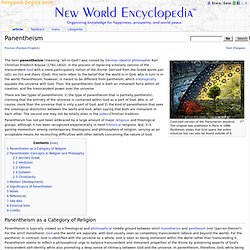
Christian mysticism. Christian mysticism refers to the development of mystical practices and theory within Christianity.
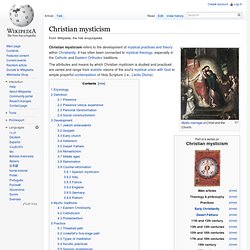
It has often been connected to mystical theology, especially in the Catholic and Eastern Orthodox traditions. The attributes and means by which Christian mysticism is studied and practiced are varied and range from ecstatic visions of the soul's mystical union with God to simple prayerful contemplation of Holy Scripture (i.e., Lectio Divina). Etymology[edit] "Mysticism" is derived from the Greek μυω, meaning "to conceal",[1] and its derivative μυστικός, mystikos, meaning 'an initiate'.